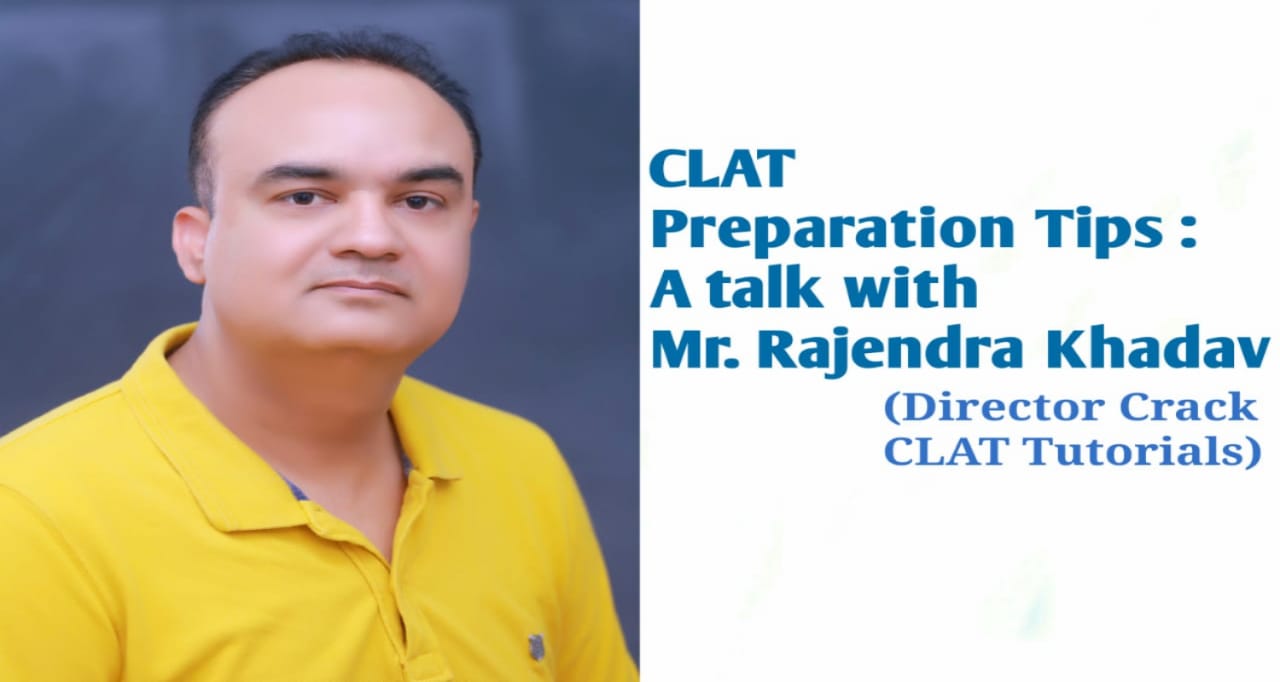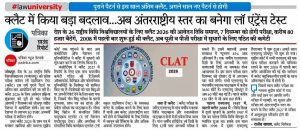Know all about CLAT Preparation
Know all about CLAT Preparation: A talk with Mr. Rajendra Khadav, Director Crack CLAT Tutorials
CLAT 2021 has been Rescheduled to 13th June from previous date 9th May. With almost 6 months left for CLAT 2021, there are a lot of questions going through the mind of students for CLAT 2021 preparation. To solve some of the important questions through expert opinions, I’ve a talk with Mr Rajendra Khadav, Director of Crack CLAT Tutorials to solve some of these important questions.
Here are excerpts from the Interview:
Question: A lot of Students might start their CLAT Preparation now, although cracking CLAT is quite tough but are there chances that a student starting his/her preparation now can crack the examination? If yes what would be some of the major tips that you would like to give these students?
Mr Rajendra Khadav: The UG CLAT seeks to evaluate comprehension and reasoning skills of aspirants. Try and read some of the same sources that the question setters are using to create questions. They should focus on increasing their speed since time is a very crucial factor in the exam. Students should be abreast with the current affairs till the last day of the exam. Keeping track of sources like newspapers and magazines would be very helpful. In particular, read the opinion and editorial sections of newspapers, as many passages are derived from such sources.
Question : Getting into an NLU through CLAT is really tough with many NLUs having reserved seats for the students of their state only. So apart from CLAT which other examinations should a student attempt to get into other good Law colleges apart from NLUs after 12th?
Mr. Rajendra Khadav: AILET for NLU Delhi, SET for Symbiosis, CET, IPU, BHU, LSAT-India etc. and many good institutes like Nirma Ahmedabad, NMIMS Mumbai, UPES Dehradun etc. affiliated with CLAT for admission into their 5 years law program.
Question: Choosing the right Books and Preparation material have always been a concern for many students preparing for CLAT as they don’t find enough past CLAT aspirants around them for recommendation as there are Engineering and Medical students in abundance. So according to you which are some of the best books for preparation that you recommend for CLAT 2021 for each of the 5 sections and overall preparation?
Mr. Rajendra Khadav: The Legal Reasoning, Logical Reasoning, and English Language sections of the UG CLAT are somewhat related, in the sense that they all require you to read and comprehend a passage well. Keeping track of sources like newspapers (recommended The Hindu & The Indian Express) and magazines would be very helpful.
Reference material – New Pattern Study Material and practice books – By Crack CLAT Tutorials.
Question: It is always advised that a student who is preparing for CLAT examination must go through the previous year papers of CLAT, According to you why it is important to solve the previous year question papers and how they are helpful for the student?
Mr. Rajendra Khadav: Solving previous years’ papers and sample papers would help enhance their speed and time management skills. They will also be acquainted to the paper structure.
Question: As we are all aware that CLAT examination consists of 5 different sections, each and every section have their own significance so, what according to you are the strategies that a student can follow to improve their performance in each section?
Mr Rajendra Khadav :
English Language
Try and read some of the same sources that the question setters are using to create questions. Keeping track of sources like newspapers and magazines would be very helpful. Practice grammar from any good 10th standard grammar textbook. Wren and Martin’s English Grammar and Composition, are very good resources for preparation.
Current Affairs, including General Knowledge
Questions in this section intended to test depth of understanding of issues and events of significance, rather than mere fact- or trivia-based superficial knowledge. The best way to prepare for this section of the UG CLAT is to have a long-term habit of reading a good set of newspapers and periodicals. Many good sources of news and information are also available online; aspirants can also visit their websites, and go through their archive of editorial and opinion pieces.
Legal Reasoning
One of the biggest differences in the pattern of the Legal Reasoning section of the UG CLAT 2021 over previous years is that the principle and facts will not be supplied separately – as such, the first thing aspirants should do is read through the passage carefully, and identify the principles set out in it. A passage may have more than one principle, and more than one set of incidents – in some instances, the questions may ask you to apply the same principle to different fact situations, whereas in others, each question may relate to a different principle and fact situation – so make sure you pay close attention to each question, determine which principle and facts have been called into question, and only then attempt the answer.
Logical Reasoning
The first thing you should do when attempting a question in this section is to carefully identify the various premises and conclusions in the passage. Once you have done this, you will be better prepared to take on the questions. With this information at hand, you should be able to easily answer questions that ask you to identify the main theme or conclusion of the passage, as well as questions that ask you to identify arguments in support of, or against, the author’s arguments.
While the Logical Reasoning section is very different from previous years’ papers, some questions from the older formats may still be included; therefore aspirants should practice with previous years’ papers, so that you can pick up some ‘easy’ marks for such questions.
Quantitative Techniques
The best way to prepare for this section is to go back to your tenth standard mathematics textbooks, and try and practice the questions and exercises in them as much as possible. Since the Quantitative Techniques section of the UG CLAT 2021 follows the general trend of changes in the CLAT towards a more comprehension-based format, it is important that you read the passages and questions very carefully, so as to ensure you have understood the information supplied, and what exactly the question is asking of you.


